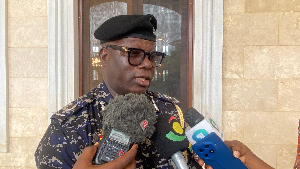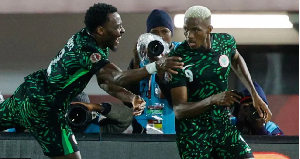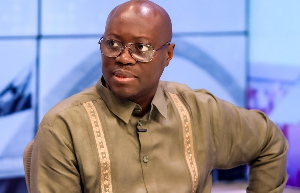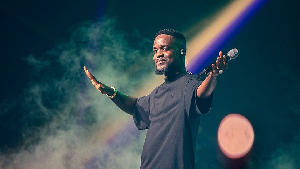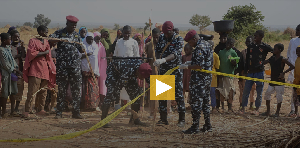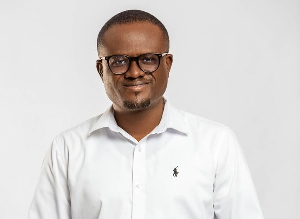On April 8, 2005, an interesting article titled ?TRIBALISM: The Skeleton In Our Closet? appeared on Ghanaweb.com. Bylined B. K. Obeng-Diawuoh, the fairly well-argued article mordantly carped the Ga-Dangme/Dangbe Council which had apparently, capriciously protested the recent appointment of Bishop George Charles Palmer-Buckle, formerly of Koforidua, as the new Archbishop of Accra. What fascinated me more than anything else about the aforementioned article, was the bland liberty which the quite eloquent writer appeared to have taken with the sticky issue of tribalism; alienated from its primary context, the reader got the erroneous impression that the Roman Catholic Church, somehow, was racially and ethnically neutral in its ideological temperament and public policy. In essence, one was left thinking that the Ga-Dangme Council was squarely to blame for the preceding, admittedly, pathetic and regressive state of affairs. But in reality, those of us who know just a little bit of Roman Catholic Church History cannot but conclude that the glaringly myopic attitude of the Ga-Dangme Council is very much in consonance with the Church?s established practice of elevating clerics ? or bishops ? from among the subject?s own people or ethnicity. Thus, we have had Archbishop Peter Akwasi Sarpong for ages as the plenipotentiary prelate of Kumasi. And in the Wa district of the Upper-West Region of Ghana, we have Bishop Dery?and the list goes on and on.
I know a little bit about the Catholic Church in Ghana, particularly its ethnocentric policy regarding the appointments of parish priests and bishops because I attended St. Peter?s Secondary School, at Nkwatia-Kwahu (or Okwawu), one of the finest of the Church?s second-cycle institutions in the country. But more importantly, I was so fascinated by the near-Spartan orderliness of Church protocol that I even seriously contemplated getting inducted into the latter?s fold as a seminarian and eventually a priest. I remember taking several solemn and quite memorable trips with the St. Peter?s chapter of the Catholic Youth Organization (CYO) to Obuoho in the Asante Region. These trips occurred in the form of retreats ? or mini-pilgrimages ? whereby we visited a sacred place upon which was constructed what was termed as ?The Stations of the Cross,? whereby pilgrims traced the historic footsteps of Jesus Christ, from the latter?s arrest to the crucifixion or the passion. And while I was enraptured by the entire experience, one thing stuck in my craw, as it were; and it was the fact that at the final station of the cross, all pilgrims ? or supplicants ? had to remove their footware and walk by the knee on a very hostile ? or rawly constructed ? cement staircase and plant a solemn but quite passionate kiss on the foot of a statue of Jesus constructed with cold concrete. The first time around, I managed to skip this repugnantly idolatrous part of the event by sliding my cheeks around the left-foot of the concrete slab and pretending to have osculated the damn clunky thing. On the second or third time around, however, I was too closely followed by Mr. Akomeah, our French teacher and a devout Catholic, to be able to perform my gimmick without getting into trouble. I thought I was about to die. And that night, upon my return to school, I prayed and fasted and asked God for remission, after which I decided to permanently part ways with Obuoho, though for some quite inexplicable reasons, I still entertained thoughts of becoming a Catholic priest, until my Presbyterian cleric, maternal grandfather sobered me with having to make a definitive choice between grandsonship with him or the proverbial highway. And to this day, I still regard myself, in certain grave respects, as a Catholic, though I am also incurably a Presbyterian.
What bothers me, however, is the apparently indelible nominal imprint of European colonialism on the priests, particularly those in Southern Ghana, who are appointed by the Church of Rome to ride herd on a largely imperialized and systematically inferiorized people. I mean, when one hears a name like George Charles Palmer-Buckle, erstwhile Bishop of Koforidua, and substantive Archbishop of Accra, what message does it send to the bulk of the parishioners who do not share such Eurocentric cultural luxury? For make no mistake, the names that we are given, or even those that we give ourselves, reflect something deep within the human psyche ? and it has more psychological gravitas than most of us ? no less brainwashed by European imperialism ? care or have enough courage to acknowledge. Of course, the usual riposte is that an individual?s ancestor was such and such European missionary do-gooder, which is all well and good, except that the fact that the concerned European ancestor abandoned his progeny on the West African coast as he headed back home to Europe, eons ago, pretty much ought to inform that particular descendant, in no uncertain terms, that he or she is a bona fide Ghanaian and African is invariably lost in the riposte. And this partly explains why I have never been particularly fascinated by such anachronistic names as Jerry John Rawlings and John (Atta) Mills. I mean, British colonial rule has long been over, and if anything at all, Paul Boateng or Ama Donkor, both of whom are Black Britons with Ghanaian ancestry, would have an extremely difficult time running for the highest office of Albion. So why do we make it so easy for these neocolonial products here in Ghana? Has it, indeed, got anything to do with the post-colonial trauma of acute inferiority complex? And then, just what makes nominal discrimination, or even racism, more acceptable in Britain than in Ghana? And, indeed, matters are not helped that much when the Archdiocese of Accra just witnessed the retirement of the venerable Bishop Dominic Andoh, whose name is also of Spanish and Portuguese ? or Latin ? origin. Of course, I vividly recognize the fact that I am treading on live coals, for I have nieces and nephews and in-laws and other relatives with names like Bart-Plange, Sykes, as well as some with Swiss-French names that I hardly ever remember. But the beautiful thing in all this is that unlike skin pigment or racial identity, names can be changed, which was why a Polish pope by the name of Karol Cardinal Wotlija could readily assume the more poetic name of John Paul II, just like most of our traditional rulers in Ghana do.
Indeed, twenty years ago, I raised this same question of psycho-nominal colonialism and got my head mangled by some Cape Coast tigers beyond recognition. Still, I am daring to raise this issue once again because I firmly believe that psychological imprisonment may yet be the greatest bottleneck to our collective national development.
And in all the preceding, one may be reasonably prompted to ask: Just where does the enduring legacy of Dr. J. B. Danquah come in? And the simple answer is that it perfectly fits within this discourse because in his quite edifying article on the purported Ga-Dangme conciliar tribalism, Mr. Obeng-Diawuoh alludes to the fact that: ?According to the [Ga-Dangme] Council, the [Accra Sports Stadium] should [ought to?] have been named after a Richard Akwei who, they [the Council] claim, served as a chairman of the GFA some time before independence. I wonder how many people in Ghana know about this obscure Richard Akwei, whose memory the protesters have suddenly invoked to back their demands for naming the Accra stadium after a Ga? (see ?TRIBALISM: The Skeleton In Our Closet? Ghanaweb.com 4/8/05). Actually, the late Mr. Richard Akwei is not nearly as obscure as Mr. Obeng-Diawuoh would have his readers and audience believe. Indeed, the name of Richard Akwei appears in the register of the Danquah-led Gold Coast Youth Conference as one of the association?s founding members from 1929. And by 1943, when Dr. Danquah wrote and published his comprehensive review of the activities of the Gold Coast Youth Conference, Mr. Richard Akwei was listed as ?Councillor Richard Akwei, vice-president, Eastern Province.? In other words, our latter subject appears to have acted as substantive president of the Eastern and Greater-Accra Regional Chapter of the Gold Coast Youth Conference. It is also likely that Mr. Richard Akwei sat as a full- and voting-member of the Gold Coast Legislative Assembly. And it is significant to point out to Mr. Obeng-Diawuoh that the facile and at once volatile tag of tribalism can be far more treacherous and outright dangerous than the critic may be wont to acknowledging. For it is indubitably rather offensive to presume that just because a particular person or writer who deems himself to be quite historiographically knowledgeable is curiously unaware of the noble contribution of another Ghanaian to the development of our country, in no way speaks to the condign obscurity of the subject being so vacuously tagged. Rather, it simply means that to be worthy of the hefty designation of a scholar or an intellectual, one ought to do his or her homework thoroughly. There may be a reason or two why today Mr. Richard Akwei has so receded into the proverbial backwaters of Ghanaian history that Mr. Obeng-Diawuoh can take the quite bizarre and curious liberty of writing the former off entirely. In sum, writing out of the depths of insuperable rage, Mr. Obeng-Diawuoh has committed exactly the same error of tribalism of which he faults the Ga-Dangme Council. And his brand of tribalism is called ?myopia,? and it is no less pernicious than its micro-nationalist counterpart. Indeed, when I embarked on the Danquah Legacy Series, the intent was not to veer or digress into the present direction; interestingly, however, now I have been pointed towards a more expansive and inclusive ideological canvas.
One thing, however, is quite certain, the apparent obscurity of Mr. Richard Akwei, at least in the rather imperious estimation of Mr. Obeng-Diawuoh, may be largely due to the fact that our mainstream Ghanaian historians have not undertaken the sort of historiographical ventures, or forays, that would ensure that most of our quiet but, nonetheless, equally diligent and illustrious pioneering statesmen and women would not be easily forgotten. And here, it bears pointing out to the reader that since the Danquah Legacy Series began, quite a legion of readers ? both Ghanaian and Diasporic African ? have written to this author congratulating and thanking him for finally resurrecting the image and enormous achievements of somebody other than the mainstream fare of President Nkrumah and his CPP stalwarts. And it has been quite dazing to hear 60-year-old Ghanaians, some of them prominent figures in their professions, confess, almost sheepishly, to this writer that until they began reading our series, the only significant data they had on Danquah was the mundane and rather pedestrian fact that the latter was widely regarded as the political arch-nemesis of President Nkrumah?s, and also the quite equally pedestrian fact that Dr. Danquah died in solitary detention on the decree of the former.
Indeed, in his review of the activities of the Gold Coast Youth Conference, Dr. Danquah laments what the general-secretary terms as the lethargic Ghanaian national temperament. Interestingly, in his book titled Ghana In Transition (1955, 1963, 1972), which we shall be examining in due course, American political scientist David E. Apter makes a similar observation. In his version, however, Danquah laments both as an insider as well as a frank and dispassionate scholar. His indisputable patriotism, nonetheless, is never wide off the mark. Thus in sarcastically comparing Africans to Jews, the author notes that while both the latter and former ethnic nationalities have endured untold brutalities across the centuries, the African has yet to creatively transform racial subjectivity into a potent weapon of Divine Selectivity. ?If history is any guide, the world?s most oppressed race are the Jews. Black men [and women] come off second best, or, perhaps, I should say the second worst. By the same standard, the Jews are the luckiest of all the human races. The Almighty made them his own chosen people? (Self-Help and Expansion 1). Further, the Doyen painfully observes: ?What of us in the Gold Coast? Our case is quite the reverse, if one is to believe the newspapers. And I, of course, believe them ? our newspapers. We are not a chosen race. Day in and day out our newspapers remind us: ?God helps those who help themselves,? and they sell the newspapers to us for a penny, and they believe they have done their duty?./Now, it is quite possible that some of us may think that we in the Gold Coast are a chosen race. Many must think so because, judging from their habit of doing nothing about public life, that must be their belief. ?In due time,? a well-known pensioner was telling me the other day, ?In God?s due time, the men I wish to work with will appear?? (Self-Help and Expansion 2).
In fine, it is the aim and objective of the Gold Coast Youth Conference to sound the clarion call to Ghanaians on the imperative need to promptly engage themselves in the shaping of their own national destiny: ?But if we are a chosen race, then, let us remind ourselves [that] we are a chosen race with a difference. We are not?as lucky as the Jews. We have no one to help us if we will not help ourselves. That, I suppose, is what we have been chosen for. We have been chosen to sit down with our arms folded, our tongues tied, our lands lying fallow in many parts, whilst others come [in] and help themselves [to] our gold and diamonds. We have been chosen to squat on our legs, unable to stand on our own legs, and stupidly leave it to others to stand on their legs for us, to govern for us ? in trust ? like the man who, when his master gave him a talent, went and hid it in the ground ? just to please his master./ That, if I am not mistaken, is what we have been chosen for ? A country and a people, full of intelligent men, full of brave men, full of self-respecting men who, nevertheless, are quite happy in doing nothing because they believe they have been chosen to be intelligent and brave and self-respecting for themselves only, and not for their neighbor, not for their people, not for their country? (Self-Help and Expansion 2-3).

Views expressed by the author(s) do not necessarily reflect those of GhanaHomePage.


